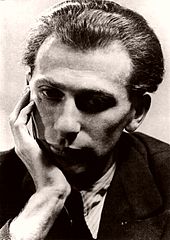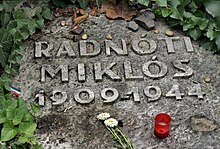Miklós Radnóti
Miklós Radnóti (born as Miklós Glatter , May 5, 1909 in Budapest , Austria-Hungary ; died November 9, 1944 near Abda near Győr ) was a Jewish Hungarian poet .
Life
The early years
Miklós Radnóti came from an integrated Jewish family. His father, Jakob Glatter, was a traveling salesman. At birth, he lost his mother, Ilona Grósz, and his twin brother. He recalls this trauma in his Ikrek hava ( Month of Twins ) collection, 1939.
His father died in 1921 when he was twelve years old. Radnóti grew up with relatives. His uncle Dezső Grósz encouraged him to continue running the family business. After graduating from high school, Radnóti initially pursued a commercial apprenticeship and took a job in his uncle's wholesale company.
First publications
In 1928 Radnóti published his first poems in a literary magazine founded with friends. His first collection of poems, Pogány köszöntő ( Pagan Greetings ), appeared in 1930, reflecting the influence of French Expressionism and attacking social injustices. In the same year he began his studies and listened to Hungarian and French literature at the University of Szeged . In 1931 his next book Újmódi pásztorok éneke ( Song of Newfangled Shepherds ) was published. It was confiscated by the prosecutor for alleged profanity. He spent three months in Paris , where he attended the Exposition coloniale . Here he translated African poems and fairy tales. From 1934, after completing his studies, he tried with little success to find a job as a teacher of Hungarian literature. He worked as a translator and private tutor. At that time he was supported by Babits Mihály , the editor of the literary magazine Nyugat . His works were first published here under the name of Miklós Radnóti . He chose the name after his father's place of birth.
In 1935 he married Fanni Gyarmati (1912–2014), whom he had known since 1926, and moved to Budapest . In the following years several volumes of poetry appeared.
In 1937 he went abroad to France, where he made contacts with left-wing parties. He had been a member of the illegal Hungarian Communist Party since the early 1930s.
The Spanish Civil War and the death of the poet Federico García Lorca had a profound impact on him and he began to focus more on translation.
The second World War
In 1942 and 1943 he was drafted into the labor service several times because of his Jewish descent. In May 1943 he converted to the Catholic faith, which, however, could not protect him from further persecution. In the same year his poetry translations were published under the title Orpheus nyomában ( In the footsteps of Orpheus ). Translations mainly by Arthur Rimbaud , Stéphane Mallarmé , Paul Éluard , Guillaume Apollinaire and Blaise Cendrars .
In May 1944 he was first ordered to the Ukrainian front and later interned in the Bor camp in Serbia . He collected the poems he wrote here in a notebook that he sent from Bor to his wife. This collection later appeared under the title Bori notesz ( Notes from Bor ). When Tito's troops advanced, he and several thousand Jewish forced laborers were forced to march across Hungary to the Austrian border. Like many of his fellow prisoners, he was no longer able to cope with the rigors of this forced march and, after his collapse, was murdered with 21 of his fellow prisoners near Abda, near the Austrian border. The mass grave was exhumed after the war in 1946. His last poems were found, which appeared in the Tajtékos ég ( Foamy Sky ) collection in 1948.
Today his tombstone is in the Kerepesi temető , a cemetery in Budapest. The statue placed at the mass grave near Abda was desecrated in 2013.
Literary work
In his poems, expressionist and avant-garde elements mix with classical forms and a strong sense of homeland. Until his last days he scribbled harrowing poems about his life in the camp on notepaper.
Some of his poems ( Nem tudhatom (1944), Erőltetett menet (1944)) are among the classics of Hungarian poetry today .
Works
- Pogány köszöntő (= pagan greeting ) (1930)
- Újmódi pásztorok éneke (1931)
- Lábadozó szél (1933)
- Újhold (= new moon ) (1935)
- Járkálj csak, halálraítélt! (1936)
- Meredek út (1938)
- Ikrek hava (1940)
- Válogatott versek (1930–1940) (1940)
- Naptár (1942)
- Karunga, a holtak ura (translated fairy tales from Africa) (1944)
- Apollinaire versei (poems by Apollinaire)
- La Fontaine meséi (Fairy Tales of La Fontaine)
Posthumously published works
- Tajtékos ég (1946)
- Bori notesz (1970)
- Napló (1989)
- Ikrek hava - Napló (2003)
Works in German
- Postcards : poems. Post-poetry and epilogue by Franz Fühmann. Volk & Welt, Berlin 1967
- Forced march. Selected poems . Reputations by Markus Bieler. Corvinus Verlag Budapest 1979. ISBN 963 13 0833 2
- Spring flies with loose hair : diaries, poems, photos, documents. From the Hungarian by Hans Skirecki - Diaries and Franz Fühmann - Poems. Edited by Siegfried Heinrichs. Lucas Presse-Oberbaum, Berlin 1993. ISBN 3-928254-20-0
- Month of Gemini : prose, poetry. Photos, documents. From the Hungarian. by Hans Skirecki, Uwe Kolbe, Franz Fühmann. Interlinear Paul Kárpáti . Edited by Siegfried Heinrichs. Lucas Presse-Oberbaum, Berlin 1993 ISBN 3-928254-03-0
- No luck back, no magic. Poems and Chronicles . Reputations by Markus Bieler, Chronicle Ulrich Schuster, Gabriella Tuntunsisz. Edited by György Dalos. Gutke Verlag Cologne 1999. ISBN 978-3-928872-32-4
Movie
- Radnóti . DEFA-Studio for Documentary Films 1984. Director: Eduard Schreiber . Length 16'30 "
Prices
- Baumgarten Prize (1937)
A Hungarian anti-racism prize is named after Miklós Radnóti.
Web links
- Literature by and about Miklós Radnóti in the catalog of the German National Library
- Krisztián Nyáry: Miklós Radnóti and Fanni Gyarmati , Hungarian Literature Network Berlin
- Forced march , his best-known poem in German translation
| personal data | |
|---|---|
| SURNAME | Radnóti, Miklós |
| ALTERNATIVE NAMES | Glatter, Miklós (real name) |
| BRIEF DESCRIPTION | Hungarian poet |
| DATE OF BIRTH | May 5, 1909 |
| PLACE OF BIRTH | Budapest |
| DATE OF DEATH | November 9, 1944 |
| Place of death | near Abda near Győr |





